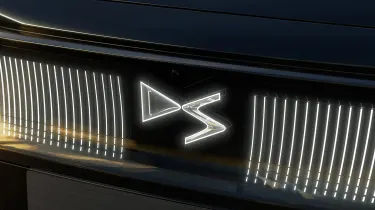
DS will follow up the launch of its DS No8 flagship coupé-SUV with a new DS No7. A more traditional, family-friendly SUV with the usual DS focus on comfort and premium materials, the DS No7 will replace the current DS 7, which was first launched as the DS 7 Crossback in 2018.
In what is something of a mini-revolution for the Stellantis Group premium brand, the new all-electric DS No8 will go on sale early in 2025 with a fresh design direction, and introducing a new naming strategy. The closely related DS No7 will follow towards the end of the year, swapping the DS No8’s sleek roofline for a taller and boxier SUV body.
The DS No7 will launch exclusively with pure-electric power, using the group’s STLA Medium (STLA M) platform, which also underpins the No8 and other recent mid-size Stellantis SUVs such as the Peugeot 3008 and Vauxhall Grandland.
Speaking at the press preview event for the DS No8, Thierry Métroz, Senior Vice President of DS Design, confirmed that the DS No7 will come next and take its technical lead from the new coupé-SUV. “The next DS, we will launch it within one-and-a-half years, [and it] will have exactly the same philosophy,” said Métroz.
He went on to explain that the No7 will be “more compact and more SUV-like, but still very efficient with the same DNA”.
“We will lower the bonnet, we will lower the roof and we will protect the roominess of the car, compared to the current DS 7,” he continued.
There are, however, no plans for a seven-seat version of the DS No7. Métroz explained how the role is already filled by other Stellantis cars, including the Peugeot 5008, and that a longer seven-seat version would not sit comfortably with the new DS focus on aerodynamics and style.
He explained: “We don’t need the seven seats because Peugeot has one. We don’t need another seven-seat car in the global line-up. For aerodynamics, if you add a third row, you need to have a more horizontal roof and you need to have the rear window more vertical. It’s very boxy. It’s not good.
“We want to do something more elegant, more compact and more premium, and the third row is to see a lot of constraints in terms of design elegance.”
The DS No7 will use the electric powertrain technology that gives the DS No8 what the brand claims is class-leading driving range and efficiency – even if the figures will ultimately be blunted by the SUV’s more boxy rear end. That means we can expect the same 74kWh and 97.2kWh battery options, the latter offered with a choice of front-wheel drive and dual-motor all-wheel drive.
Performance will also be in the same ballpark as the No8, which offers 227bhp in entry-level 74kWh battery form or up to 350bhp in the High Range 97.2kWh battery 4x4 models, yielding a 0-62mph time of 5.4 seconds.
Intriguingly, DS is also leaving the door open to eventual petrol powertrains in the No7, as the rate of electric car uptake in Europe continues to trail expectations. Métroz explained that a new mild hybrid powertrain is being considered for the DS No7 and future new models.
He said: “I remember three or four years ago Stellantis said it will be only BEV in a few years for all the brands. Now, we don’t know. We have BEV, but we are looking to introduce a MHEV mild hybrid for the new generation of DS.
“If we want, we can do it very quickly without expense because of STLA M. We can save all the design, we only have to change the front bumper for the ICE cooling system. It’s not planned for No8 at the moment, but that could change and maybe the company could decide to do it, you know, in 2025.”
After the new DS No7 emerges in 2025, DS will turn its attention to replacing the other models in its range. The process will start with the DS No3 and then the DS No4. Executives would not be drawn on the possibility of a new DS No9 luxury car based on the elegantly retro DS SM Tribute concept shown in September 2024, but it’s clear DS has a packed schedule of new car launches until at least 2027 as it renews its efforts to become an established premium brand player.
